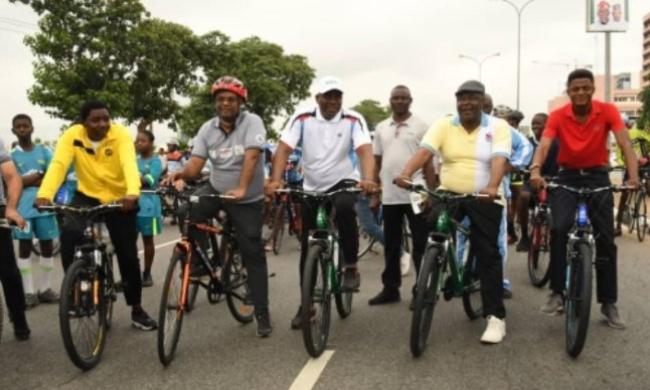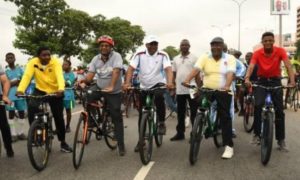Men riding bicycles
By Our Reporter
The removal of fuel subsidy by the President Bola Tinubu administration is hiiting hard on the residents of Borno State.
So bad is the situation that residents in Maiduguri have abandoned their cars and resorted to riding bicycles to thier destinations.
On account of this development, hundreds of Borno State workers, students and other residents have abandoned their cars and resorted to bicycles as a means of transportation because of the increase in hike of fuel prices and cost of commercial transport system, Daily Trust has gathered.
Some weeks ago, there were only a few bicycles on the roads in Maiduguri, the Borno State capital, but the city began to see numerous bikers after the Tinubu government removed gasoline subsidies.
At the present time, many of the state residents, including the rich and poor, have embraced bicycles as their carriers within the metropolis, Daily Trust reports.
It was mocked at first, but as transportation expenses continue to climb, a growing number of students, workers, and businesses have turned to it to save money.
The usage of bicycles has helped thousands of inhabitants in various ways, despite the fact that there are several benefits.
Many car owners have abandoned their vehicles th resorted to riding of bicycles to get from one place to another.
The residents who were interviewed by Daily Trust noted that in addition to reducing the cost of transportation, the use of bicycles was making them healthier.
Imam Kalli Imam, one of the students who ride on bicycles to Ramat Polytechnic on a daily basis said, “It is joyous going to school on a bike. We laugh, yell and exchange pure joy with commuters and fellow students from home down to the school premises.”
“It is a feeling I never had, but now, I don’t waste time waiting for a cab. I am always in school on time. I am full of energy and independent. And this has motivated some of my classmates to begin biking; they are enjoying it,” he said.
Jesse Adamu, a National Diploma 2 student of Quantity Surveying at Ramat Polytechnic, said he usually rode his bicycle from the Customs area to the school, a distance of almost four kilometers.
“I don’t have money to pay for hostel fee, and transport fare keeps increasing every day, so I started using my bicycle to school.”
As the use of bicycles expands throughout Maiduguri, merchants and repairers have begun to prosper.
Malam Abubakar Mohammed, a repairer and trader of used bicycles in the city’s Monday Market neighborhood, said business had grown by more than 100 per cent.
“Before the fuel subsidy removal, I could spend the whole day without any customer coming for repairs; and many second hand bicycles filled my shop.
“But less than a week after the announcement, many bicycle owners came and reclaimed them. All the bicycles you see now were brought for repairs. In fact, we are now overwhelmed with buyers and bicycles for repair,” he said.
It was also observed that in response to the situation at hand, bike-for-hire business is spreading in the city.
Given the current circumstances, many Maiduguri citizens are urging the state administration to consider establishing separate roadways for bikes out of concern for their safety.
“Now that people patronise riding over driving, the number of bicycles in the town will double. So, if the state government is not quick to build safe roads for cyclists, I am afraid that accidents would increase,” Malam Saminu, a former vehicle inspection officer said.


